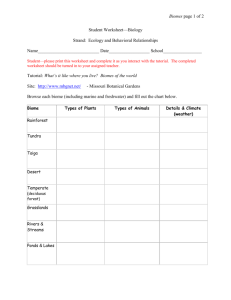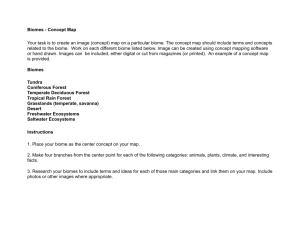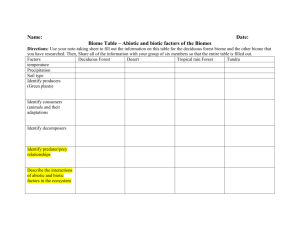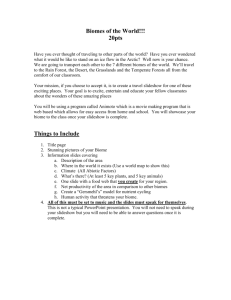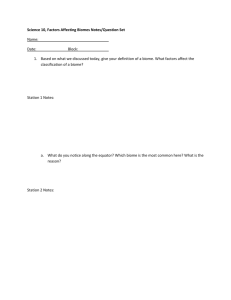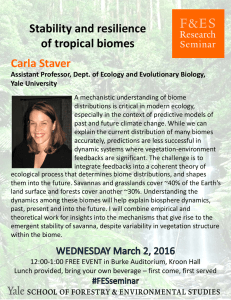What is an adaptation?
advertisement
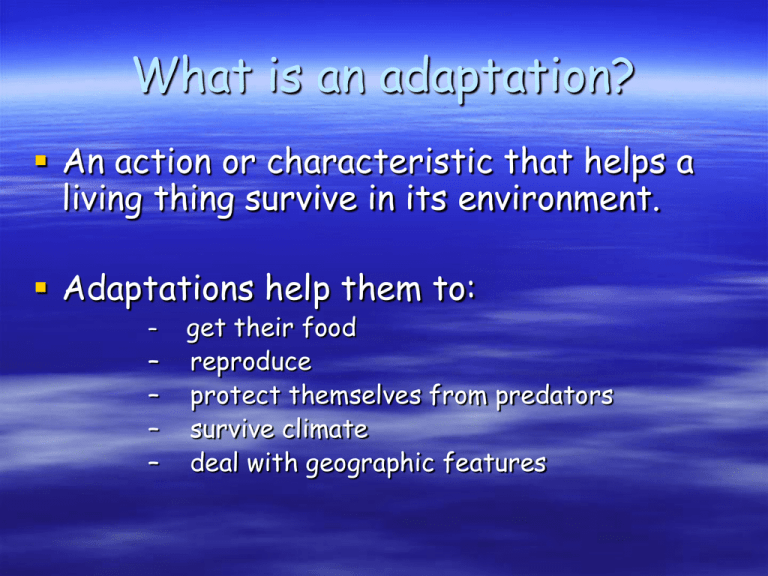
What is an adaptation? An action or characteristic that helps a living thing survive in its environment. Adaptations help them to: – – – – – get their food reproduce protect themselves from predators survive climate deal with geographic features Getting food Venus fly trap Reproduction Male peacock Protecting themselves from predators Cactus Surviving climate Polar bear Dealing with geographic features Polar bear Biomes of the World What is a biome? Areas of the world with similar climates, land features and plants and animals. Animals and plants in each biomes have special adaptations to help them survive in their environment. The World’s Biomes Land Biomes Rainforests Tundra Taiga or coniferous Desert Grasslands Deciduous Freshwater River Pond/lakes Wetlands Marine Shoreline Tropical oceans Temperate oceans #1 The world’s largest biome is very cold and found in the northern part of the world. It contains mainly coniferous trees, such as spruce and pine. These trees produce cones and have leaves shaped like needles. Boreal Forest or taiga #2 You can find many trees, like maple and oak, in this biome. These trees shed their leaves and grow new ones each year. It has warm summers and cold winters. It is the biome we live in. Deciduous forest #3 This biome has very extreme weather. It is very hot during the day and very cold at night. Because of the weather, plants are usually short and hardy. You can find plants like the cactus growing here. Desert #4 This biome has hot summers and cold winters. There is not enough rainfall for many trees to grow, but you can find a lot of grass. It is home to the largest land animals on earth. Grasslands #5 This biome lies near the equator. About half of the world’s plant and animal species are found here. It is usually warm and humid all year and there is a lot of rain. Tropical rainforest #6 This treeless biome is usually very cold and very dry. The soil is frozen all year around, this is called permafrost. It can support plants such as mosses and short grasses. This biome is located in the northern most part of the world. Tundra Streams and rivers ponds and lakes •Running water •Fewer plants and algae *standing water freshwater *more plants and algae Estuary Found where fresh river water and salty ocean water meet Intertidal zone Found between the highest and lowest tide. Organisms must be adapted to survive pounding waves, and changes in water level and temperature. Neritic zone Found below the lowtide line and out over the continental shelf. Since sunlight can pass through the shallow water, this area in rich with life. Surface zone Light is able to penetrate the first few hundred meter on the surface of the open ocean. Larger marine animals can be found in this zone. Deep zone Found below the surface of the open ocean, this zone is almost completely dark.
